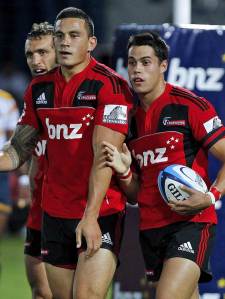Owen Franks. Brad Thorn. Sam Whitelock. Kieran Read. Dan Carter. Sonny Bill Williams. Robbie Fruean. Israel Dagg. What do all these names have in common?
You would be forgiven if you thought I was naming members of the latest All Black squad. All of these players, especially on current form, are shoo-ins to be part of it.
 But really I’m naming members of the current Crusaders squad in the Super 15 and these eight are just the tip of the iceberg. Now add in other luminaries such as Ben Franks, Corey Flynn, George Whitelock, Andy Ellis, Zac Guildford, Sean Maitland, and the legendary Richie McCaw. Suddenly it becomes crystal clear why the Crusaders are the best team in the Super 15 this season.
But really I’m naming members of the current Crusaders squad in the Super 15 and these eight are just the tip of the iceberg. Now add in other luminaries such as Ben Franks, Corey Flynn, George Whitelock, Andy Ellis, Zac Guildford, Sean Maitland, and the legendary Richie McCaw. Suddenly it becomes crystal clear why the Crusaders are the best team in the Super 15 this season.
See, the Crusaders boast a starting lineup that could potentially be an All Black team all on its own. Not just in terms of reputation, but in terms of form as well. And with McCaw – the only player to have won multiple IRB World Player of the Year Awards – yet to play a game this season, they can only get better.
The stats probably say it best. The Crusaders’ 151 points scored and 65 allowed place them first and third respectively in those categories. They have scored a competition-leading 17 tries and wing Sean Maitland is the leading try-scorer with five tries to his name.
Despite a round one setback against the Blues, the Crusaders look nigh on unstoppable. Their fast, physical, and unpredictable game lends itself well to an era of structured defence and gym-monkey players. If you look at their lineup from one to fifteen you’ll see a legion of big men who can move and who know how to handle a rugby ball.
Chief amongst them are the center combination of Sonny Bill Williams and Robbie Fruean. It certainly helps that they get the ball from Dan Carter, but these two are enough to scare props, let alone other centers. Their combination of speed, strength, passing, and awareness is simply unmatched in the Super 15 – and maybe even in the world. Williams is 6’3″ and 238lbs while Fruean is 6’4″ and 242lbs. Considering that most centers usually measure around 6′ and around 200lbs, Williams and Fruean represent some pretty heavy artillery.
 The scariest part is that they both can play. They don’t just charge at the line and hope to smash through a tackle. Williams’ offloading skills that he developed during his days in rugby league allow him to stand up in the tackle and release the devastating strike weapons outside of him. Fruean has the speed of a wing to capitalize on those chances as well as the awareness needed to put his actual wings away instead of trying to take on defenders single-handedly.
The scariest part is that they both can play. They don’t just charge at the line and hope to smash through a tackle. Williams’ offloading skills that he developed during his days in rugby league allow him to stand up in the tackle and release the devastating strike weapons outside of him. Fruean has the speed of a wing to capitalize on those chances as well as the awareness needed to put his actual wings away instead of trying to take on defenders single-handedly.
Speaking of those wings, I am still amazed that Sean Maitland hasn’t been capped for the All Blacks. Seriously. Just imagine him on the opposite wing as Hosea Gear wreaking destruction on other nations in the World Cup. Maitland is possessed of blinding pace and has the positional awareness and kicking skills that come with playing the last ITM Cup season at fullback. He also plays the Crusader-style game that is favoured by Graham Henry and co. to perfection, running off his centers and popping up in unexpected places. It will be interesting to see how his partnership with Zac Guildford and Israel Dagg develops as the season progresses as both are also candidates for New Zealand’s World Cup squad.
Other than the immortal Messrs. Carter and McCaw, the Crusaders have another area in which they particularly excel: the tight five. The Crusaders’ second row is stocked full of talent with the experienced figures of Brad Thorn and Chris Jack competing with youngster Sam Whitelock – already a All Black regular – for a starting spot. All three have the skills to play in the loose in addition to their in-tight muscle and aggression. The front row of the Franks brothers, Ben and Owen, and Corey Flynn is also one of the best units in the Super 15. Owen Franks has made the All Black tighthead jersey his own in the wake of Carl Hayman’s departure and only the stubborn Tony Woodcock of the Blues keeps Ben out of the national side.
In their history, the Crusaders have won seven Super Rugby titles. With a lineup that could match most national teams and a style of game that they execute with such precision, it won’t be long before they add an eighth trophy to their mantle.
Everyone should be scared.



